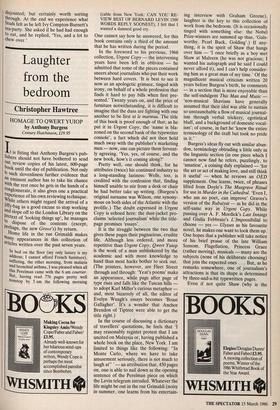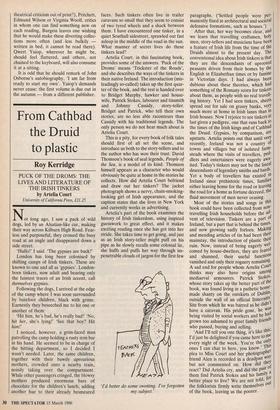Laughter from the bedroom
Christopher Hawtree
HOMAGE TO QWERT YUIOP by Anthony Burgess
Century Hutchinson, £19.95
I. t is fitting that Anthony Burgess's pub- lishers should not have bothered to send out review copies of his latest, 600-page !000k until the day of publication. Not only 15 such slovenliness further evidence that all eminent author has to take his chance With the rest once he gets in the hands of a c°11810merate, it also gives one a practical experience of his own reviewing technique. W.. hile others might regard the arrival of a ilffy-bag as a good excuse to stop working and slope off to the London Library on the pretext of 'looking things up', he manages to dispose of the contents (except, Perhaps, the new Grove's) by return. Home life in the rue Grimaldi makes lnanY appearances in this collection of articles written over the past seven years.
In bed on the floor (my only luxury is my address; I cannot afford French furniture), suffering, the other morning, from malaria and bronchial asthma, I was pleased when all this Perelman came with the 6 am courrier. But, having read 776 pages pretty well nonstop by 5 am the following morning
(cable from New York: CAN YOU RE- VIEW BEST OF BERNARD LEVIN 1500 WORDS REPLY SOONEST), I felt that I wanted a damned good cry.
One cannot say how he answered, for this book contains only a third of the amount that he has written during the period.
In the foreword to his previous, 1968 collection, Urgent Copy — the intervening years have been left in oblivion — he admitted that some of the pieces contained sneers about journalists who put their work between hard covers. 'It is best to see it now as an apologetic grimace, tinged with irony, on behalf of a whole profession that finds it hard to pay bills when first pre- sented.' Twenty years on, and the price of furniture notwithstanding, it is difficult to imagine that the duns are fighting with one another to be first at le marteau. The title of this book is proof enough of that; as he put it in Urgent Copy, the 'name is bla- zoned on the second bank of the typewriter console', a fact which did not then hold much sway with the publisher's marketing men — now, one can picture them fervent- ly agreeing. 'Yes, yes, of course, and the new book, how's it coming along?'
Pretty well, one should think, for he attributes (twice) his continued industry to a long-standing laziness: Wells, too, is credited with the confession that, finding himself unable to stir from a desk or chair he had better take up writing. (Burgess's original surname was Wilson, one synony- mous on both sides of the Atlantic with the prolific.) The doubt expressed in Urgent Copy is echoed here: the dust-jacket pro- claims 'selected journalism' while the title- page promises 'essays'.
It is the struggle between the two that gives these pages their pugnacious, erudite life. Although less ordered, and more repetitive than Urgent Copy, Qwert Yuiop is the work of a man unblinkered by the academic and with more knowledge to hand than most hacks bother to seek out. (The printers, however, are Fleet Street through and through: `Yeat's poems' make an appearance, while page after page of type rises and falls like the Tuscan hills — to adopt Karl Miller's curious metaphor — and, most bizarrely of all, the editor of Evelyn Waugh's essays becomes 'Boast Gallagher'. It's a wonder that Anchor Brendon of Tiptree were able to get the title right.) In the course of discussing a dictionary of travellers' quotations, he feels that 'I may reasonably register protest that I am uncited on Malaysia or, having published a whole book on the place, New York. I am limited to things like the following: "In Monte Carlo, where we have to take amusement seriously, there is not much to laugh at" ' — an attribution that, 450 pages on, one is able to nail down as the opening sentence of the Perelman piece on which the Levin telegram intruded. Whatever the life might be out in the rue Grimaldi (noisy in summer, one learns from his entertain- ing interview with Graham Greene), laughter is the key to this collection of work from the bedroom. (It is occasionally tinged with something else: the Nobel Prize-winners are summed up thus, 'Gals- worthy, Pearl Buck, Golding'.) If any- thing, it is the spirit of Shaw that hangs over him — 'I once briefly as a boy met Shaw at Malvern (he was not gracious; I wanted his autograph and he said I could never afford it), and I can't help consider- ing him as a great man of my time.' Of the magnificent musical criticism written 20 years before Burgess's birth, he comments — in a section that is more enjoyable than the self-indulgent This Man and Music — 'non-musical Shavians have generally assumed that their idol was able to sustain so unstaunchable a flow of musical journal- ism through verbal trickery, egotistical bluff, and a background of domestic vocal- ism' ; of course, in fact he 'knew the entire terminology of the craft but took no pride in it.'
Burgess's ideas fly out with similar aban- don, terminology obtruding a little only in the linguistic section (in one piece which I cannot now find he refers, puzzlingly, to `amation', a coining duly explained — 'for the art or act of making love, and still think it useful' — when he reviews an OED supplement. One learns, twice, of phrases lifted from Doyle's The Musgrave Ritual for use in Murder in the Cathedral. 'Even I, who am no poet, can improve' Graves's version of the Rubaiyat — as he did in the self-same way in Urgent Copy. While passing over A. F. Mordick's Last Innings and Giulia Febbraio's L'Impossibilita to choose — yes — Ulysses as his favourite novel, he makes one want to look them up. One hopes that a publisher will take notice of his brief praise of the late William Sansom. Flagellation, Princess Grace (rather moving), musicals — many are the subjects (none of his deliberate choosing) that join the expected ones. . . But, as he remarks somewhere, one of journalism's attractions is that its shape is determined by three-and-a-bit typewritten pages.
Even if not quite Shaw (why is the theatrical criticism out of print?), Pritchett, Edmund Wilson or Virginia Woolf, critics in whom one can find something new on each reading, Burgess leaves one wishing that he would make these diverting collec- tions more often (and less bulkily — written in bed, it cannot be read there). Qwert Yuiop, wherever he might be, should feel flattered, and others, not chained to the keyboard, will also consume it at a sitting.
It is odd that he should remark of John Osborne's autobiography, 'I am far from ready to start my own'. Yuiop's demands never cease: the first volume is due out in the autumn — from a different publisher.



















































 Previous page
Previous page